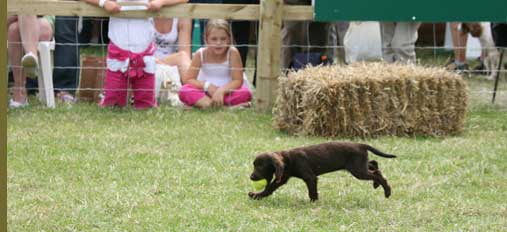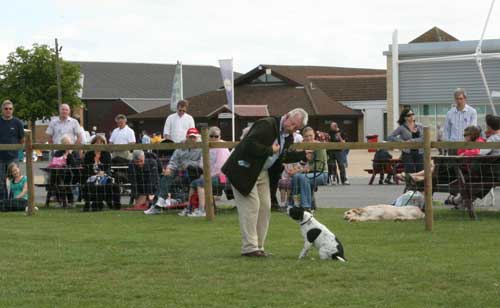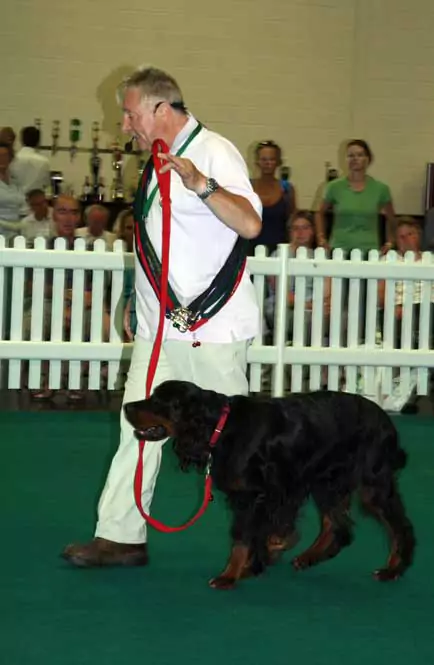Training Vs Behaviour?
Often people are confused about Dog Behaviour Training or Obedience Training. This explains which one you may need
Basic Dog Obedience Training

Basic Commands such as Heel on Lead, Sit, Down, Stand, Sit Stay, Down Stay and Recall, works for many of our dogs to help them to understand what is expected of them.
Yet, many of the dogs that I treat whilst able to heel perfectly well on a lead or sit whilst you talk to a friend, are often acting out behavioural issues at home or in the park.
These problems are rarely if ever addressed in the obedience training hall. That is why I currently do not have adult classes.
I am a firm believer in puppy training and socialisation classes. (The earlier the better) as puppies learn more between eight to sixteen weeks that at any other time during their lives.
This is the time for your dog to be introduced to children, other dogs, strangers, traffic, and all the things they may encounter during their lives. This is also the pivotal time to instill certain disciplines such as recall, jumping up, and walking to heel.
A good obedience instructor should be able to help you with some of the more common “dog problems” such as housebreaking, nipping and mouthing, chewing and walking to heel. It is a sad fact that many obedience instructors haven’t the experience or the training to address the more serious problematic issues.
These problems may include agoraphobia, separation anxiety, personality disorders, stealing, resource guarding, depression, dominance, nervousness and aggression etc. If you are having “behavioural” issues with your dog, you need to address these BEFORE you attempt organised obedience training.
It was my intention, with my brother Paul who is also a practicing behaviourist, to start an organisation that combines the skills of the “Obedience Trainer” with the scientific and behavioural techniques of the “Behavioural Counselor” I fervently believe that you need both skills to successfully treat our dogs.
At present there are organisations such as the APDT which are primarily the scout hall type of trainer. And then you have the APBC that is supposed to be the behaviourists, effectively never the twain shall meet. They tend to be distrustful and disdainful of each other.


At present some behavioural practitioners have grandiose titles such “Clinical Behaviourist” This is meant to imply they have clinical skills, which unless they are also a Vet is untrue. All “clinical behaviourist” means is they see your dog in a clinic instead of where they should actually see your pet, which is in its own surrounding ie the home or where the behaviour occurs. Then you can see the real behaviour, rather than a dog that is inhibited by the very clinic itself.
I am also finding that some of the behaviourists have clients that are desperately disappointed at the outcome. They often will not even touch or handle the dogs in any way. Never mind come up with a viable and workable program to help solve the dogs and the owners problems.
Many of these behaviourist and trainers have taken weekend courses, and are then sent out on the unsuspecting general public with a grandiose titles, but very little practical or academic knowledge.
I was at a show called Just Dogs Live at the East of England Showground a couple of years ago. We saw one of these well known experts who licence others through short courses. My brother and I were working with dogs out of the audience, that we had never handled or met before.
I demonstrate hands on work at various shows and major events. This well known expert came on and started training a puppet. She had a staff member running around with a puppet on his arm, that she was teaching to sit and stay and other training techniques.
To say I was shocked was putting it mildly. But it brought home just how little knowledge, ability and experience some of these people have. Then they run courses and licence others. I took a couple of pictures of this expert before her staff ran over and were trying to block me from taking them. There is a major difference from writing books about a method and actually putting into practice.
I believe it takes a minimum of seven years working experience, plus study and exams, and a minimum of 2000 dogs you have treated or worked with personally for behavioural problems on a one to one basis before you can call yourself a true expert and a behaviourist.
Some so called Behavioural Counselors may be coming out of University with a shiny new degree, in most cases none of the work is practical, it is all academic. That is like learning to drive a car by reading a book. Some do not even know which end of a dog to feed. many have never even owned or even handled dogs. You will find you will get a nice 30 to 50 page report on the behavioural problems of your dog, but what about the hands on practical help and advice that you REALLY need.
Some of these academics, claim Doctorates and use the term Dr at every opportunity. However many of these PhD’s are not related in any way to dogs. I have an Honorary Doctorate in Metaphysics but would never use it, though I am fully entitled to do so, as it was granted by an awarding body. I believe it would lead my clients to wrongly assume that the Doctorate was fully earned and was to do with animal behaviour and specifically dogs, which of course it is not.
| Is your dog pulling on the Lead, Unruly, Bad Recall, Aggressive on Lead, Jumping Up? See my article and Video Clips on how to stop this. The Jingler |
Behaviour Modification

Which includes operant conditioning, desensitisation and reinforcement training. Modern reinforcement training is based on behavioural science. Reinforcers may be of a POSITIVE nature, something you might like and want more of, or NEGATIVE, something to be avoided. Knowing which is appropriate and WHEN to give it is the key to modifying behavioural traits. Many of the behaviour problems seen today are as much a result of the “drive level” of the dog, as they are the misapplied corrections that we humans quite often give our pets.
Lack of controlled early socialisation plays a key role in many behavioural problems we see in our adult dogs. Too little or no socialisation is the root cause of many of the fear and aggressive behaviour’s prevalent today. Too much socialisation, also known as flooding can also cause behavioural difficulties with rude over boisterous bullies that plague our parks ands streets.
Anthropomorphism
This means attributing human characteristics and traits to animals. Which can be another contributing factor to behavioural problems and is often the main reason why owners find it difficult to communicate effectively with their dog.
What is anthropomorphism? The textbook definition of anthropomorphism is: to assign human emotion or thought patterns to animals or objects which are incapable of achieving such dimensions. This would be like explaining that a vine climbs up the tree to get a better view of the garden.
Why do we engage in such behaviour?
Humans are better able to relate to something when they see themselves in it. Using the plant example, this is an example of projection. Projection is a psychological phenomenon in which one projects their feelings upon others, animals, or objects.
This is useful in everyday life for it takes the guess work out of reality. Instead of constantly contemplating why something is as it is, you simply put it into context with your everyday life. Dogs unfortunately are not Human or Primate they are Canids and therefore think and see the world and our human morals very differently to ourselves. To read more about this see my article on Understanding Dogs Abilities.
It is vitally important that you also understand the critical learning periods and these can be be seen on my website, read Critical Periods part one and two. To really understand your dogs language and how it communicates read my articles on Communication part one and two. Also read the Alpha Myth that explains why it is impossible for us to really be an alpha or pack leader. It also explains how we should be really controlling out dogs.
And finally if you get it all right, you will hopefully live in harmony with a pet that is a pleasure to live with rather than the unruly thugs we see on a day to day basis who are sometimes an unmitigated nightmare to own and handle.
Stan Rawlinson 2009






